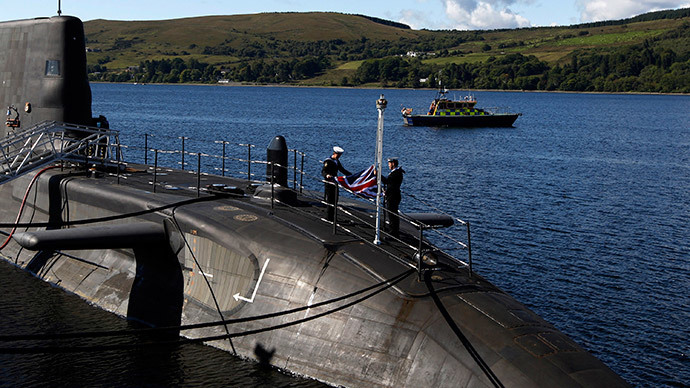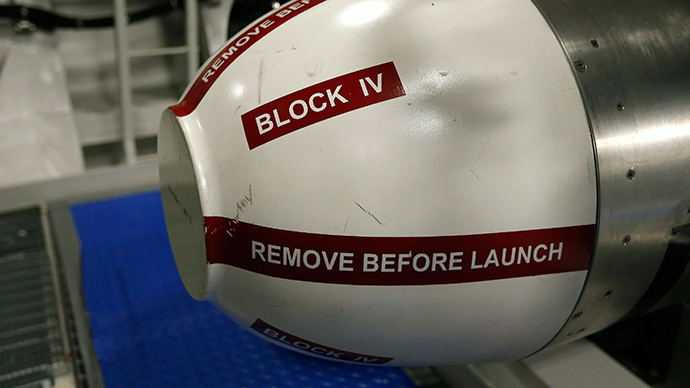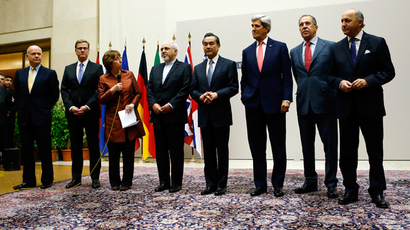UK’s nuclear deterrent fully depends on US, cross-party commission finds

Britain’s $170 billion Trident nuclear missile program has won the support of an independent cross-party commission, but found to be totally dependent on US
Britain’s $170 billion Trident nuclear missile program has won the support of an independent cross-party commission tasked with identifying the value of the UK’s deterrent, due for renewal in 2016. This comes despite the commission’s acknowledgement of Britain’s total dependence on US systems.
The commission’s findings come as a blow to anti-nuclear campaigners, who are calling for the program to be drastically scaled back or the total disarmament of the UK’s nuclear-armed submarine fleet, arguing the money spent on an extremely costly system could be better spent on social needs and jobs at a time of austerity throughout the UK.
The Campaign for Nuclear Disarmament (CND) estimate that the £100 billion required to renew Trident could employ 150,000 nurses, build 1.5 million homes or 30,000 new primary schools in the country.
The authors of the report, however, were not convinced by alternatives to the Trident ballistic missile submarine system, claiming Britain should retain nuclear weapons for deterrence against “possible overwhelming threats from hostile nuclear-armed states” and as a contribution to NATO.
The report states: “If there is more than a negligible chance that the possession of nuclear weapons might play a decisive future role in the defence of the United Kingdom and its allies, in preventing nuclear blackmail, or in affecting the wider security context within which the UK sits, then they should be retained.”
However, the report notes that Britain's deterrent is “a hostage to American goodwill.”
It adds: “If the United States were to withdraw their cooperation completely, the UK nuclear capability would probably have a life expectancy measured in months rather than years”.
“The UK is dependent on the United States for many component parts of the guidance and re-entry vehicle, and for the Trident ballistic missile system itself.”
Launched in February 2011 by the British American Security Information Council (BASIC), the commission was chaired by cross-party peers Lord Browne, Sir Malcolm Rifkind, and Sir Menzies Campbell.
Besides costs, the report addresses key questions over the UK’s future as a nuclear armed state, whether Trident is the only or best option for delivering the deterrent, and what the state can do to facilitate faster progress on global nuclear disarmament.

It also examined the international context, citing the reemergence of Russia as a potential threat, while considering UK policy on efforts to promote multilateral nuclear disarmament and non-proliferation.
“It is lamentable that three years of hard work has not moved on the debate around Britain’s weapons of mass destruction,” said Campaign for Nuclear Disarmament (CND) general secretary Kate Hudson, reacting to the commission’s findings.
“The Trident Commission should have listened to the majority of the British people who oppose Trident replacement – and the overwhelming majority internationally who want to see a world free of these monstrous and outdated weapons. Instead the Commission has produced a rehash of Cold War thinking which fails to acknowledge that the world has moved on."
“The Government’s own National Security Strategy downgraded the likelihood of a state-on-state nuclear attack: prioritizing terrorism, climate change and cyber warfare. To suggest that the UK should spend £100bn on a weapons system which we could never use and which doesn’t meet the threats we face is mindboggling.”
Scottish CND also criticized the Trident Commission for supporting Britain's continued possession of nuclear weapons, based in Scotland, suggesting the report makes September’s independence referendum more pertinent.
John Ainslie, Coordinator of Scottish CND, said: “Malcolm Rifkind, Des Browne and Menzies Campbell are stuck in the past. The future is in the hands of the people of Scotland. We can vote Yes and kick out these indiscriminate weapons of mass destruction.”














